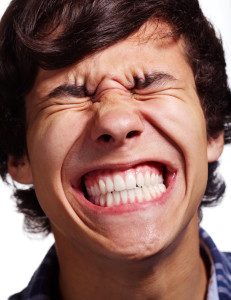 Hopefully, you know that brushing and flossing your teeth at least twice a day is the most effective way of keeping them healthy. Nevertheless, many patients undermine their hygienic efforts by habitually grinding their teeth together (bruxism), often without even realizing it. The excessive strain and pressure, when left unchecked, can destroy a patient’s teeth; however, the habit itself often goes unrealized until damage becomes apparent, at which point extensive dental work is often required to repair a patient’s smile. Many patients who visit our Astoria dentist’s office have unwittingly worn down or destroyed their teeth through habitual teeth grinding. While Dr. Leibowitz is highly skilled at restoring damaged smiles, he warns that recognizing and dealing with the habit is the best way to ensure that bruxism doesn’t lead to related issues, such as TMJ disorder.
Hopefully, you know that brushing and flossing your teeth at least twice a day is the most effective way of keeping them healthy. Nevertheless, many patients undermine their hygienic efforts by habitually grinding their teeth together (bruxism), often without even realizing it. The excessive strain and pressure, when left unchecked, can destroy a patient’s teeth; however, the habit itself often goes unrealized until damage becomes apparent, at which point extensive dental work is often required to repair a patient’s smile. Many patients who visit our Astoria dentist’s office have unwittingly worn down or destroyed their teeth through habitual teeth grinding. While Dr. Leibowitz is highly skilled at restoring damaged smiles, he warns that recognizing and dealing with the habit is the best way to ensure that bruxism doesn’t lead to related issues, such as TMJ disorder.
Is Your Oral Health Care a Grind?
Your mouth is the most used part of your body, and on average, biting and chewing can place up to 200 pounds of pressure on a patient’s back molars. Luckily, your teeth are designed to absorb the stress of everyday use and are protected by the strongest substance your body produces (tooth enamel). Still, even healthy teeth aren’t designed to withstand constantly grinding against each other, which can wear down and damage healthy tooth structure and overexert the jaw. Left untreated, the damage may cost you one or more teeth, and your jaw’s joints (TMJs) and muscles can suffer from fatigue, damage, misalignment, and/or inflammation—conditions that contribute to pervasive TMJ disorder.
Teeth Grinding Risk Factors
Numerous factors can contribute to habitual teeth grinding, or bruxism, including excessive stress and an uneven bite. Unfortunately, many patients grind their teeth most often while sleeping, making it difficult to consciously stop. If you’re under an unusual amount of stress, suffer from TMJ disorder, or are afflicted with malocclusion (crooked teeth), then you’re at an increased risk of habitual teeth-grinding. Common signs of bruxism include (but are not limited to);
- Chronic headaches, especially upon waking up
- Habit of chewing on ice, pens, pencils, and other non-chewable items
- Excessive tooth wear, especially on the chewing surfaces
- Cracked, fractured, or broken teeth
About Dr. Leibowitz:
Dr. Jeffrey Leibowitz, a native New Yorker, has served patients and families from Astoria, Queens, Manhattan, Brooklyn, and all surrounding communities since opening his dental practice in 1991. To schedule an appointment at our Astoria dentist’s office, contact us at (718) 728-8320 today.


